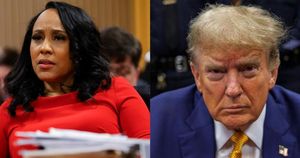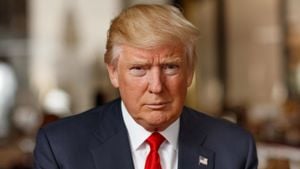U.S. cybersecurity officials have issued dire warnings about increasing cyber threats, particularly those tied to foreign actors targeting the upcoming 2024 presidential election. Most notable among these threats is the reported targeting of Donald Trump and J.D. Vance by Chinese hackers, raising alarms across various sectors.
The Federal Bureau of Investigation (FBI) recently spotlighted these threats, linking them to Chinese cyber activities aimed at undermining election security. The uptick in phishing attacks and misleading information campaigns suggests state-sponsored efforts to influence the election dynamics. Officials attributed these tactics to advanced persistent threat (APT) groups identified as targeting American political figures, particularly those aligned with Trump and his supporters, including J.D. Vance.
According to multiple sources, these cyberattacks have manifested primarily through sophisticated phishing schemes. For example, earlier this week, many users reported receiving authentic-looking emails mimicking official communications. These emails prompted recipients to click on links, which led them to fraudulent sites intended to harvest personal information. Officials pointed out the alarming authenticity of the communications, making them difficult to distinguish from legitimate correspondence.
During the 2020 election, similar tactics were employed, primarily by Russian actors. Now, with the 2024 election approaching, the cybersecurity community is on high alert for any sustained foreign interference. Intelligence reports indicate China is stepping up its efforts, potentially seeking to gain leverage by exploiting divisions within the American electorate.
Cybersecurity expert Dr. Marcy Hightower emphasized the urgency of vigilance: "This isn't just about election integrity; it's about national security. When foreign actors meddle, they threaten our democratic process from the inside out." Many cybersecurity firms are ramping up their defenses, offering tools and education to help political organizations ward off these intrusive threats.
The recent incidents have also drawn critiques from lawmakers about the preparedness of U.S. infrastructure to handle such threats. Sen. Elizabeth Warren remarked, "We can’t allow foreign adversaries to dictate our elections through cyber warfare. It’s imperative we have safeguards implemented before it's too late." Her statement reflects growing bipartisan concern over the vulnerabilities our electoral system faces as it adapts to higher stakes.
At the heart of the matter is the need for comprehensive strategies to counter these threats, including public awareness campaigns about recognizing phishing attempts and bolstering IT systems to effectively repel unauthorized access.
Meanwhile, as Trump ramped up his campaign activities, he remains undeterred by these challenges. The former president recently held rallies where he enthusiastically rallied supporters, emphasizing his experience against what he terms "deep state oppression." His proactive engagement with constituents through social media has endured, highlighting his belief in maintaining traditional campaign methods to counter the threats from modern technology.
Trump has consistently downplayed the significance of foreign interference, asserting more focus should be placed on “domestic collusion” within the electoral process. He contended, "We need to address the failures at home before worrying about foreign actors. At the end of the day, it’s the American people who determine their fate." Supporters echo his sentiments, believing the focus should remain on addressing local economic and social issues rather than foreign meddling.
On the flip side, Vance, who has recently aligned himself closely with Trump, has been more inclined to highlight the dangers posed by these cyber threats. Vance's campaign has adopted a dual approach: emphasizing domestic economic issues and advocating for stronger national security measures against foreign interference. His stance resonates with many voters concerned about diminishing American sovereignty and integrity.
While the underlying motivations for these attacks are complex, cybersecurity analysts highlight nationalism, geopolitical rivalry, or sometimes simply opportunism. Experts argue it’s imperative to establish strong deterrents against cyber operations, ranging from diplomacy to outright sanctions against states engaged in election interference.
The response to these threats isn’t purely political. There’s increasing collaboration between private companies and the federal government, emphasizing the importance of shared intelligence and rapid responses to incipient threats. Several tech firms have stepped up their contributions to establishing more secure voting infrastructure, providing various cybersecurity tools to political candidates.
Innovations such as two-factor authentication, secure communications platforms, and comprehensive training for staff will play pivotal roles. The hope is to create layers of security reducing the chance of successful foreign infiltration around the election period.
Domestically, individuals have already begun to notice increased scrutiny. Social media platforms are enforcing stricter regulations on political ads and misinformation, attempting to create environments less susceptible to foreign manipulation. Major networks are under pressure to vet their political content more thoroughly, ensuring factors like campaign financing transparency are upheld.
For many citizens, the fear of foreign interference feels very real. A recent opinion poll indicated over 70% of respondents expressed concerns about outside influence on the elections—a clear signal lawmakers cannot overlook. The ramifications are broad, with many questioning whether traditional election systems can withstand this wave of tech-driven efforts targeting their legitimacy.
The situation has also sparked debates surrounding legislation. Lawmakers are exploring comprehensive measures targeting funding for election security, with various proposals advocating for investment to secure infrastructure against cyber threats. Communities are also encouraged to engage with local officials to discuss vulnerabilities but are often met with hesitation among local leadership reluctant to confront the scale of the threat.
The stakes are undoubtedly high as the nation heads toward the 2024 election. Voters and officials alike are acutely aware of the role cybersecurity will play, joining forces to safeguard democracy amid swirling controversies and uncertainties.
The public is left pondering: can American democracy withstand these challenges, or will foreign powers manipulate the electoral process once again? The answers hinge not just on protective measures but also on how engaged every American stays throughout the election season. After all, they hold the ultimate power to decide the country's future.



